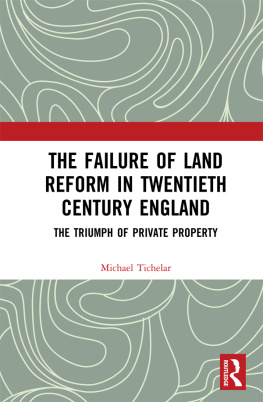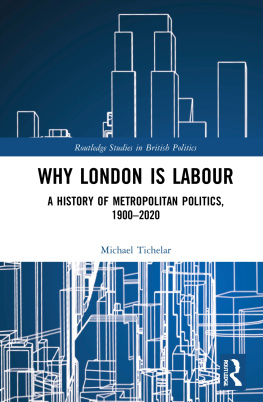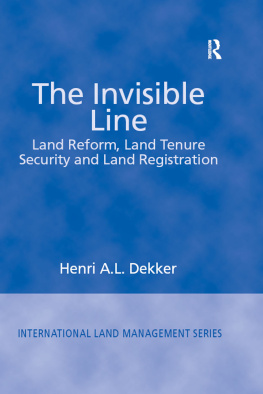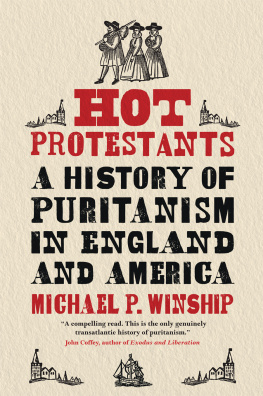The Failure of Land Reform in Twentieth-Century England
Based on a mixture of primary historical research and secondary sources, this book explores the reasons for the failure of the state in England during the twentieth century to regulate, tax, and control the market in land for the common or public good. It is maintained that this created the circumstances in which private property relationships had triumphed by the end of the century. Explaining a complex field of legislation and policy in accessible terms, the book concludes by asking what type of land reform might be relevant in the twenty-first century to address the current housing crisis, which seen in its widest context, has become the new land question of the modern era.
Michael Tichelar is Visiting Fellow in History at the University of the West of England, UK, and author of The History of Opposition to Blood Sports in Twentieth Century England: Hunting at Bay.
First published 2019
by Routledge
2 Park Square, Milton Park, Abingdon, Oxon OX14 4RN
and by Routledge
711 Third Avenue, New York, NY 10017
Routledge is an imprint of the Taylor & Francis Group, an informa business
2019 Michael Tichelar
The right of Michael Tichelar to be identified as author of this work has been asserted by him in accordance with sections 77 and 78 of the Copyright, Designs and Patents Act 1988.
All rights reserved. No part of this book may be reprinted or reproduced or utilised in any form or by any electronic, mechanical, or other means, now known or hereafter invented, including photocopying and recording, or in any information storage or retrieval system, without permission in writing from the publishers.
Trademark notice: Product or corporate names may be trademarks or registered trademarks, and are used only for identification and explanation without intent to infringe.
British Library Cataloguing-in-Publication Data
A catalogue record for this book is available from the British Library
Library of Congress Cataloging-in-Publication Data
Names: Tichelar, Michael, author.
Title: The failure of land reform in twentieth-century England : the triumph of private property / Michael Tichelar.
Description: Abingdon, Oxon ; New York, NY : Routledge, 2019. | Includes bibliographical references and index.
Identifiers: LCCN 2018009402 | ISBN 9780415793346 (hbk) | ISBN 9781315211121 (ebk)
Subjects: LCSH: Land reformEnglandHistory20th century. |
Land useEnglandHistory20th century. |
Land tenureEnglandHistory20th century.
Classification: LCC HD1333.G72 E5485 2018 | DDC 333.3/1420904dc23
LC record available at https://lccn.loc.gov/2018009402
ISBN: 978-0-415-79334-6 (hbk)
ISBN: 978-1-315-21112-1 (ebk)
Typeset in Times New Roman
by Out of House Publishing
by Kenneth O. Morgan
For close to four centuries, ever since the Civil Wars, radical movements in England have been arguing over reform of the land its ownership, its use, its profitability, its value as a source of wealth for the community as a whole. Similar conflicts took place in Scotland, Wales and especially southern Ireland, inflamed there by the power of nationalism. It is a central theme in our social and political history, but, unlike conflicts in industrial England, has seldom received the synoptic attention from historians that it deserves. It is, therefore, a pleasure to welcome this lucid and thoroughly researched book by my former student, Michael Tichelar. He initially wrote an excellent doctoral thesis under my supervision covering the Labour Partys policies and ideas on the land question down to the Attlee government after 1945. Here he takes a broader view of radical pressures for land reform in late nineteenth- and twentieth-century Britain, the focus of their campaigns, and the many and complex reasons for their failure to achieve significant results.
He begins with the debates of the late Victorian period, focussing on the political and economic power of aristocratic landlords during the high noon of industrialisation. The problems of the land now had identifiable human causes in the owners of great estates: they had names and addresses. Two broad demands emerged from the left at that time. There was concern over ownership, focussing on pressures for land nationalisation, much stimulated by the writings of the American single landtax advocate, Henry George, which featured in the programme of the Labour Party after the First World War. And there was the alternative demand for the taxation of the rising value of land, the so-called unearned increment, created not by parasitic landowners but by the advance and progress of the community as a whole. The Liberals called for the rating of site values. In the Edwardian period this reached a climax in Lloyd Georges Peoples Budget of 1909, rejected at first by a reactionary House of Lords, which included taxes on the growth of the value of especially urban land. The unearned increment was at last being confronted. To Liberals it was a supreme political and moral issue God gave the land to the people as the land campaign song had it. In fact, the taxes on land produced very little, were condemned for holding back housebuilding, and were abolished in 1920 ironically when Lloyd George himself was prime minister.
After the First World War, the vastly increased power of the state in controlling and planning land use led to the land question changing its character. The pre-war issue of site value rating went into severe decline, like the Liberal Party, its champion. The large estates of the past were widely sold off and land-holdings transferred. Interest now turned to the role of land use in connection with town and country planning. The land was now of major interest as a public amenity (through the national parks movement) and its efficiency for productive agriculture. The former Liberal Minister Dr Christopher Addison committed Labour to policies for marketing agricultural products and guaranteed farm prices. Meanwhile Labour swung from taxes on land to state ownership to nationalisation as the Chartists had long ago demanded.
The Second World War, even more than the First, saw another thrust towards state intervention in the land market. This was partly due to the social disaster inflicted by the Luftwaffe during the Blitz, which in this one respect had some positive outcome. It also led to fierce arguments within the Churchill Cabinet in 1944 over the Uthwatt Report, which called for the widespread acquisition of land for public purposes and 75% taxes on annual increases in the site value of land. But Uthwatt proved to be more divisive than Beveridge and calls for a betterment levy on land development were set aside. So too was land nationalisation which had featured prominently on Labours programme in the 1930s but was destined not to follow mines, railways, iron and steel into public ownership. A reason for the failure of these schemes was the opposition of Labour-led local authorities to the control of this vital resource by central government. Here wartime campaigns for radical post-war reconstruction yielded very little.
After the war, Labour remained cautious on land reform. Land nationalisation retreated as a priority for the left, and the party returned again to the issue of the unearned increment through recouping the proceeds via betterment taxation. The party turned now to the productivity of land and the need for stimulating food production and the general efficiency of the farming industry. The main energy of ministers went into town and country planning, including the development of new towns. But the surge of private property in land and housing after 1951, during years of Conservative government, committed ideologically to a property-owning democracy led to a revival in ideas of land reform in the sixties. A Land Commission, set up in 1964, tried to check the profit-making by rampaging property developers (who faced much public ignominy by this time), renewed the attack on the unearned increment and gave some force to older ideas of public ownership or control by seeking to buy all land earmarked for development. But this, too, proved to be ineffective and the Conservatives abandoned the Commission on both efficiency and ideological grounds. The rights of property owners were given priority, attempts by the state to intrude into the ownership of developed land or tax its profits were rebuffed, and a thriving land market, backed by a huge mortgage market, held sway.








